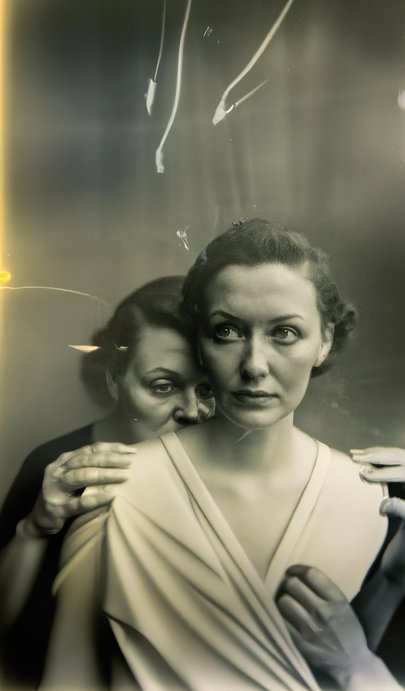For the first time, an AI-generated image wins an international photography competition
DFA member Boris Eldagsen's image "PSEUDOMNESIA | The Electricia" won the Open Competition in the Creative category at this year's Sony World Photography Awards.
The black-and-white portrait of two women was created with the help of AI image generators, making it the first fully synthesized work in a prestigious photography competition.
Eldagsen submitted it in open competition along with more than 200,000 images from other entrants in over 200 countries, and made no attempt to disguise the work's AI origins. Meanwhile, the organizer said the decision to choose the image was in line with the medium's traditional pioneering role.
The award comes amid a fierce debate about the opportunities and risks of AI technology and what it means for art and photojournalism. The German Photographic Academy [Deutsche Fotografische Akademie (DFA)] is taking it as an opportunity to publish its position paper on AI, which it has been working on in recent weeks. It is part of the current coordination process of the professional associations organized in the German Photographic Council [Deutscher Fotorat]. The council is expected to issue a joint position paper in April and organise a symposium on the topic in the second half of the year.
Image Generation by Artificial Intelligence from the perspective of the German Photographic Academy (DFA e.V.)
Methods for processing and generating images with the help of artificial intelligence are currently developing at an enormous speed. They will fundamentally influence workflows in all areas of photography. Depending on their characteristics, they open up new possibilities for processing camera-based images or creating entirely synthetic images. These are mostly based on existing images that have been used as training data for AI systems, with or without the knowledge of the creators of these images.
Creative Freedom and Copyright
As artists we are open-minded to all further developments of photographic techniques and plead for the unrestricted right to use all methods free of censorship for the creation of visual artworks. Generative AI allows new methods of artistic production. We do not see it as a risk by displacing previous practices, but as an extension of the spectrum of artistic activities.
We advocate an adaptation of copyright law that allows for copyright protection of such pictorial works. Criteria for the protection of works should not depend on the way they are created or the tools used.
Fair Sharing
Generative AI also allows the imitation of images by defining specific content or appearance or by giving instructions such as "in the style of". For some AI systems, it is known that the works of certain artists were processed for the generation of the images. For other systems, it is unclear where the training data was derived from. We call for disclosure of image sources by the providers of AI systems. The development of these systems must include effective mechanisms for artists to exercise the right of disposal over the use of their works. Initiatives are needed to adapt copyright law so that criteria of rights infringement include, in addition to the classic use of works through copying and reproduction, use in the training of AI systems in the future. If such use takes place, there must also be mechanisms for fair remuneration for creators of visual works used in this way.
Protection of Documentary Veracity
With great concern, we see that the rapidly increasing quality of AI-generated images makes it more and more difficult to distinguish between synthetic and camera-based images. In the very near future, it will no longer be possible to distinguish the documentation of a real scene from a modified or completely synthesized image visually or with forensic methods.
Although classical methods of image processing also allow such manipulations, the proliferation of AI tools makes it possible to generate and circulate manipulated images in almost any quantity with minimal effort. This endangers democratic discourse both through manipulation by means of convincing image forgeries and through justified general doubt about the authenticity of images.
If the manipulation as well as the truthfulness of documentary representations can no longer be plausibly proven, social consensus loses its basis. We support the development of technical methods to verify the creation of images in cameras and the logging of subsequent processing steps, for example by digitally signing image data. We call on all actors in the creation and dissemination of documentary images to commit to using such methods as soon as possible.
- https://dfa.photography
2023-03-15 • press contact: Dr. Jürgen Scriba (managing director), scriba@dfa.photography, +49 9331 9893399
